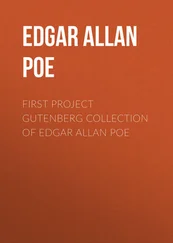Edgar Poe - Von Kempelen and His Discovery
Здесь есть возможность читать онлайн «Edgar Poe - Von Kempelen and His Discovery» весь текст электронной книги совершенно бесплатно (целиком полную версию без сокращений). В некоторых случаях можно слушать аудио, скачать через торрент в формате fb2 и присутствует краткое содержание. Жанр: Классическая проза, на английском языке. Описание произведения, (предисловие) а так же отзывы посетителей доступны на портале библиотеки ЛибКат.
- Название:Von Kempelen and His Discovery
- Автор:
- Жанр:
- Год:неизвестен
- ISBN:нет данных
- Рейтинг книги:5 / 5. Голосов: 1
-
Избранное:Добавить в избранное
- Отзывы:
-
Ваша оценка:
- 100
- 1
- 2
- 3
- 4
- 5
Von Kempelen and His Discovery: краткое содержание, описание и аннотация
Предлагаем к чтению аннотацию, описание, краткое содержание или предисловие (зависит от того, что написал сам автор книги «Von Kempelen and His Discovery»). Если вы не нашли необходимую информацию о книге — напишите в комментариях, мы постараемся отыскать её.
Von Kempelen and His Discovery — читать онлайн бесплатно полную книгу (весь текст) целиком
Ниже представлен текст книги, разбитый по страницам. Система сохранения места последней прочитанной страницы, позволяет с удобством читать онлайн бесплатно книгу «Von Kempelen and His Discovery», без необходимости каждый раз заново искать на чём Вы остановились. Поставьте закладку, и сможете в любой момент перейти на страницу, на которой закончили чтение.
Интервал:
Закладка:
Von Kempelen and His Discovery
by Edgar Allan Poe
After the very minute and elaborate paper by Arago, to say nothing of the summary in 'Silliman's Journal,' with the detailed statement just published by Lieutenant Maury ,it will not be supposed, of course, that in offering a few hurried remarks in reference to Von Kempelen's discovery, I have any design to look at the subject in a scientific point of view. My object is simply, in the first place, to say a few words of Von Kempelen himself (with whom, some years ago, I had the honor of a slight personal acquaintance), since every thing which concerns him must necessarily, at this moment, be of interest; and, in the second place, to look in a general way, and speculatively, at the results of the discovery.
It may be as well, however, to premise the cursory observations which I have to offer, by denying, very decidedly, what seems to be a general impression (gleaned, as usual in a case of this kind, from the newspapers), viz.: that this discovery, astounding as it unquestionably is, is unanticipated.
By reference to the 'Diary of Sir Humphrey Davy' (Cottle and Munroe, London, pp. 150), it will be seen at pp. 53 and 82, that this illustrious chemist had not only conceived the idea now in question, but had actually made no inconsiderable progress, experimentally, in the very identical analysis now so triumphantly brought to an issue by Von Kempelen, who although he makes not the slightest allusion to it, is, without doubt (I say it unhesitatingly, and can prove it, if required), indebted to the 'Diary' for at least the first hint of his own undertaking.
The paragraph from the 'Courier and Enquirer,' which is now going the rounds of the press, and which purports to claim the invention for a Mr. Kissam, of Brunswick, Maine, appears to me, I confess, a little apocryphal, for several reasons; although there is nothing either impossible or very improbable in the statement made. I need not go into details. My opinion of the paragraph is founded principally upon its manner. It does not look true. Persons who are narrating facts, are seldom so particular as Mr. Kissam seems to be, about day and date and precise location. Besides, if Mr. Kissam actually did come upon the discovery he says he did, at the period designated—nearly eight years ago—how happens it that he took no steps, on the instant, to reap the immense benefits which the merest bumpkin must have known would have resulted to him individually, if not to the world at large, from the discovery? It seems to me quite incredible that any man of common understanding could have discovered what Mr. Kissam says he did, and yet have subsequently acted so like a baby—so like an owl—as Mr. Kissam admits that he did. By-the-way, who is Mr. Kissam? and is not the whole paragraph in the 'Courier and Enquirer' a fabrication got up to 'make a talk'? It must be confessed that it has an amazingly moon-hoaxy-air. Very little dependence is to be placed upon it, in my humble opinion; and if I were not well aware, from experience, how very easily men of science are mystified, on points out of their usual range of inquiry, I should be profoundly astonished at finding so eminent a chemist as Professor Drape r, discussing Mr. Kissam's (or is it Mr. Quizzem's?) pretensions to the discovery, in so serious a tone.
But to return to the 'Diary' of Sir Humphrey Davy. This pamphlet was not designed for the public eye, even upon the decease of the writer, as any person at all conversant with authorship may satisfy himself at once by the slightest inspection of the style. At page 13, for example, near the middle, we read, in reference to his researches about the protoxide of azote: 'In less than half a minute the respiration being continued, diminished gradually and were succeeded by analogous to gentle pressure on all the muscles.' That the respiration was not 'diminished,' is not only clear by the subsequent context, but by the use of the plural, 'were.' The sentence, no doubt, was thus intended: 'In less than half a minute, the respiration [being continued, these feelings] diminished gradually, and were succeeded by [a sensation] analogous to gentle pressure on all the muscles.' A hundred similar instances go to show that the MS. so inconsiderately published, was merely a rough note-book, meant only for the writer's own eye, but an inspection of the pamphlet will convince almost any thinking person of the truth of my suggestion. The fact is, Sir Humphrey Davy was about the last man in the world to commit himself on scientific topics. Not only had he a more than ordinary dislike to quackery, but he was morbidly afraid of appearing empirical; so that, however fully he might have been convinced that he was on the right track in the matter now in question, he would never have spoken out, until he had every thing ready for the most practical demonstration. I verily believe that his last moments would have been rendered wretched, could he have suspected that his wishes in regard to burning this 'Diary' (full of crude speculations) would have been unattended to; as, it seems, they were. I say 'his wishes,' for that he meant to include this note-book among the miscellaneous papers directed 'to be burnt,' I think there can be no manner of doubt. Whether it escaped the flames by good fortune or by bad, yet remains to be seen. That the passages quoted above, with the other similar ones referred to, gave Von Kempelen the hint, I do not in the slightest degree question; but I repeat, it yet remains to be seen whether this momentous discovery itself (momentous under any circumstances) will be of service or disservice to mankind at large. That Von Kempelen and his immediate friends will reap a rich harvest, it would be folly to doubt for a moment. They will scarcely be so weak as not to 'realize,' in time, by large purchases of houses and land, with other property of intrinsic value.
In the brief account of Von Kempelen which appeared in the 'Home Journal,' and has since been extensively copied, several misapprehensions of the German original seem to have been made by the translator, who professes to have taken the passage from a late number of the Presburg 'Schnellpost.' 'Viele' has evidently been misconceived (as it often is), and what the translator renders by 'sorrows,' is probably 'lieden,' which, in its true version, 'sufferings,' would give a totally different complexion to the whole account; but, of course, much of this is merely guess, on my part.
Von Kempelen, however, is by no means 'a misanthrope,' in appearance, at least, whatever he may be in fact. My acquaintance with him was casual altogether; and I am scarcely warranted in saying that I know him at all; but to have seen and conversed with a man of so prodigious a notoriety as he has attained, or will attain in a few days, is not a small matter, as times go.
'The Literary World' speaks of him, confidently, as a native of Presburg (misled, perhaps, by the account in 'The Home Journal') but I am pleased in being able to state positively, since I have it from his own lips, that he was born in Utica, in the State of New York, although both his parents, I believe, are of Presburg descent. The family is connected, in some way, with Maelzel, of Automaton-chess-player memory. In person, he is short and stout, with large, fat, blue eyes, sandy hair and whiskers, a wide but pleasing mouth, fine teeth, and I think a Roman nose. There is some defect in one of his feet. His address is frank, and his whole manner noticeable for bonhomie. Altogether, he looks, speaks, and acts as little like 'a misanthrope' as any man I ever saw. We were fellow-sojouners for a week about six years ago, at Earl's Hotel, in Providence, Rhode Island; and I presume that I conversed with him, at various times, for some three or four hours altogether. His principal topics were those of the day, and nothing that fell from him led me to suspect his scientific attainments. He left the hotel before me, intending to go to New York, and thence to Bremen; it was in the latter city that his great discovery was first made public; or, rather, it was there that he was first suspected of having made it. This is about all that I personally know of the now immortal Von Kempelen; but I have thought that even these few details would have interest for the public.
Читать дальшеИнтервал:
Закладка:
Похожие книги на «Von Kempelen and His Discovery»
Представляем Вашему вниманию похожие книги на «Von Kempelen and His Discovery» списком для выбора. Мы отобрали схожую по названию и смыслу литературу в надежде предоставить читателям больше вариантов отыскать новые, интересные, ещё непрочитанные произведения.
Обсуждение, отзывы о книге «Von Kempelen and His Discovery» и просто собственные мнения читателей. Оставьте ваши комментарии, напишите, что Вы думаете о произведении, его смысле или главных героях. Укажите что конкретно понравилось, а что нет, и почему Вы так считаете.









